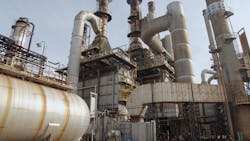Petrobras’s REPAR completes renewable diesel production testing
Petróleo Brasileiro SA (Petrobras) has concluded industrial-scale tests for production of renewable diesel at its 208,000-b/d Presidente Getúlio Vargas refinery (REPAR) in Araucária, Paraná, Brazil (OGJ Online, June 24, 2020).
Completed on July 11, the tests resulted in production of 40 million l. of renewable diesel from a feedstock of 2 million l. of soybean oil, Petrobras said.
Results of the testing will be reported to Brazil’s Agência Nacional do Petróleo e Biocombustível (ANP) to contribute ANP’s approval of the renewable paraffinic diesel (HVO) as a regulated product, according to the operator.
Adoption of HVO—which, also known as green diesel, improves performance of engines by helping prevent clogging of filters, pumps, and injectors—not only would help supply—together with existing biodiesel production—the portion of biofuel that must be mixed with diesel sold at Brazilian service stations, but also would support Brazil in achieving the P8 phase of its air pollution control program for motor vehicles (Programa de Controle da Poluição do Ar por Veículos Automotores; Proconve) applicable to new on-road heavy-duty vehicles taking effect in phases during 2022-23, Petrobras said in June.
HVO can be produced in dedicated plants or via coprocessing of renewable raw material (vegetable oil, animal fats) together with mineral diesel in units inside oil refineries using Petrobras’s proprietary H-Bio process.
Unlike biodiesel produced by the simpler process of transesterification—in which vegetable oil or animal fat reacts with an alcohol in the presence of catalysts—the H-Bio process—in which vegetable oil and petroleum distillate is mixed in a hydrotreating unit—results in a more stable renewable diesel. Since HVO produced by Petrobras does not contain glycerin or metals—and since its molecules are the same as those of conventional, petroleum-based diesel—it can be blended with the diesel pool without restrictions, according to the operator.
According to studies by Associação dos Produtores de Biocombustíveis do Brasil (APROBIO; Brazilian Biodiesel Producers Association)—use of renewable diesel reduces greenhouse gas emissions by about 70% compared to traditional, petroleum-based diesel and 15% compared to biodiesel, Petrobras said, adding that Brazil’s fuel distributors currently mix at least 12% of biodiesel with conventional diesel, which will increase to 15% by 2023.
While the operator disclosed no further details regarding REPAR’s renewable diesel production, Petrobras did reiterate any entry of such fuel into the market still depends on ANP regulation.
About the Author
Robert Brelsford
Downstream Editor
Robert Brelsford joined Oil & Gas Journal in October 2013 as downstream technology editor after 8 years as a crude oil price and news reporter on spot crude transactions at the US Gulf Coast, West Coast, Canadian, and Latin American markets. He holds a BA (2000) in English from Rice University and an MS (2003) in education and social policy from Northwestern University.

